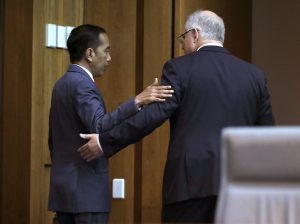Two critical issues now facing Australia due to the COVID-19 pandemic are, first, a deteriorating relationship with China and second, the United States and its chaotic political leadership during the crisis, including the dramatic economic impact that is now being felt across the nation.
These two issues coincide with China continuing to expand its activities in the South China Sea — including around Indonesia’s Natuna Islands — and also becoming more belligerent and aggressive. In this environment, Australia’s relationship with Indonesia, and also India, needs to be embraced and strengthened.
What complicates this important strategic objective is that Australia’s need to enhance its relationship with Indonesia comes at a time when its northern neighbor faces both a health and economic calamity far greater than being experience in Australia, and one that potentially could lead to a recession, with GDP falling from a growth rate of 5.2 percent to less than 2 percent.
As of May 8, Indonesia had recorded 13,112 COVID-19 cases and 943 deaths, but the official numbers have been derived from a testing rate of around 240 per million people; compared with many nations including Australia, with testing rates around 9,000-18,000 per million citizens. Arguably, Indonesia’s official figures are significantly understated and it is just at the beginning of a long battle with COVID-19, along with the disturbing economic consequences.
Meanwhile, as millions of Indonesians find themselves out-of-work, President Joko “Jokowi” Widodo has announced a financial safety-net for those who need urgent government support. But with 26 million people earning less than$1.30 per day, and another 60 million people earning only slightly more than that, trying to support all of Indonesia’s citizens affected by the economic fall-out of COVID-19 will be near impossible.
Indonesia desperately needs financial and medical support, but with Australia focused on its own COVID-19 issues – and with the Department of Foreign Affairs working to repatriate thousands of Australians still stranded overseas — there has been little time to consider the needs of Australia’s neighbors and building a much needed closer and deeper relationship with Indonesia.
In the past three weeks, Australia has recalled Gary Quinlan, its highly respected and experienced ambassador to Indonesia, for genuine health reasons. The move unfortunately was seen as Australia abandoning Indonesia in their time of need, along with most Jakarta-based journalists including those from the ABC, Fairfax and News Limited. The “abandonment” view is incorrect, but perception is everything.
China has already indicated it is ready to “rescue” Indonesia, along with plans to reinstate tourist flights to Bali as early as June. Fortunately for Australia, offers of help from China are often greeted by many Indonesians with scepticism due to a long-standing distrust and suspicion of the Chinese.
In a post-COVID-19 world, Australia and Indonesia will both need to build on their existing relationship that, while extensive, is lacking in depth — both countries have little understanding of each other among their wider communities. Both nations will need to substantially increase their intelligence sharing capacity and also defense including military and protection ties and joint naval patrols. Australia also will need to resist the temptation to reduce its foreign aid to Indonesia as part of its own budget repair mission, and to use these funds to build capacity within Indonesia’s public service administration, policing, health, education and security sectors.
The recently concluded trade agreement, known as the Indonesia-Australia Comprehensive Economic Partnership Agreement, or IA-CEPA, provides a significant opportunity for both nations to create a deeper and stronger business and trade relationship, with a focus on partnerships that can include agriculture, services, education, infrastructure and health. IA-CEPA must now be fully implemented as a matter of priority.
Australia nor Indonesia can deal with a recalcitrant China alone. They need the “strangers next door” like never before. Indonesia and Australia will need each other, as they need India too, not only for their own economic progress, but importantly, for future security and stability within the region.
Australia has been good on rhetoric about its relationship with Indonesia. “Less Geneva, more Jakarta,” was a term coined by former Prime Minister Tony Abbott, it may soon need to become, “A bit less Beijing, and a lot more Jakarta.” The pandemic is surely going to test the sincerity and depth of such words. Indonesia will need to reciprocate and to reinforce the desire for a strengthened and deeper mutual commitment to each other.
Ross B. Taylor AM is the president of the Perth-based Indonesia Institute Inc.

































